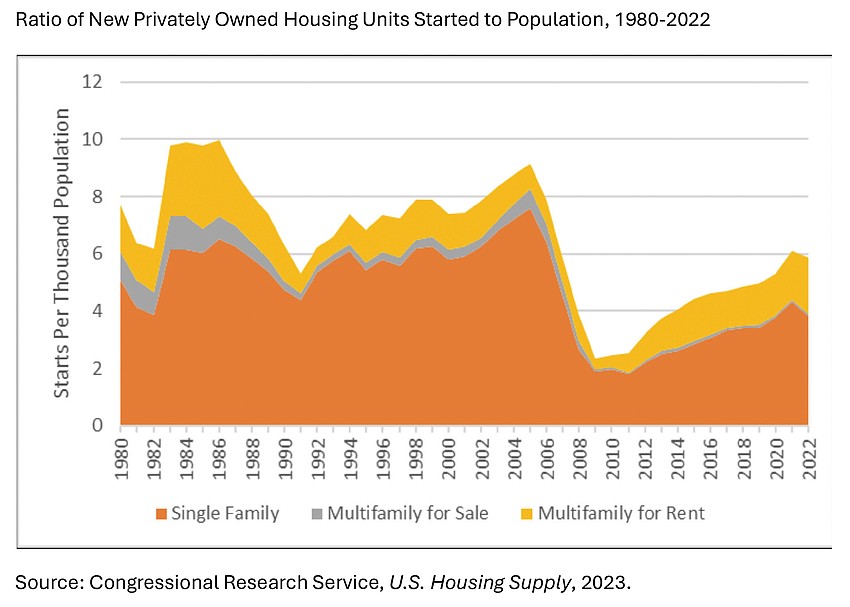- November 5, 2025
-
-
Loading
Sarasota City Manager Marlon Brown says that it is time for the city government to get into the housing business.
Brown is proposing to the -Sarasota City Commission a complicated proposal to develop 192 affordable housing units across the street from City Hall. The plan considers buying up two parcels of land to create the project; having a private partner manage the housing for the city; asking local foundations and others to help fund the project; and selling ground floor commercial space in the buildings.
Estimated cost: around $80 million.
I could not find any details on who would build the project.
Brown wrote to the commissioners: “While some might question the government’s intervention in these matters, solely relying on the private sector hasn’t yet yielded significant results. We cannot remain passive as the demand for affordable/attainable workforce housing surges.”
There are many problems with this proposal. It risks a lot of money; it’s an approach that has failed over and over again; and it’s trying to work around a problem the city itself creates.
The city would have to bet a lot of money on this project. Starting with about $7.4 million to buy the land. If the project never materializes, that money — $4.5 million which may come from foundations — is already spent.
Also, the city would have to bet it can balance the politics of setting rents for housing in the city housing project against the cost of building and maintaining the project. The end result of that balancing act is almost always to funnel a stream of tax dollars into the project rather than charge rents that cover costs.
What’s more, the city would be making a long-term investment to solve a problem that could change dramatically in coming years.
Many, many cities have suffered massive costs for getting rid of public housing projects that became obsolete.
For around two decades, local governments across the United States and the federal government have been turning away from government-owned housing as a solution, in large part because they failed so miserably. Cities from Los Angeles to New York have shut down and demolished government-owned housing projects and shifted to helping people get private housing instead.
In the 1990s, the U.S. military privatized millions of units of government-owned housing around military bases. In recent years, dozens of universities have privatized student housing projects the universities built in earlier years. In both cases, they did so because they were not good at providing housing.
A recent review of the history of government-owned housing by Governing Magazine called it “government-backed ghettos.” The liberal Brookings Institution outright says that government-owned housing is not the answer to affordability, for four reasons:
The Sarasota Housing Authority is a nonprofit entity mostly funded by the federal government to help people afford housing in Sarasota. It has tried for years to build affordable housing in the city and found it frustrating.
Its latest project, Lofts on Lemon II, is plagued with problems: delays that threaten time-limited funding; requests from city officials to add features to the project that dramatically increase the costs and make the units less affordable.
Sarasota Housing Authority President and CEO William Russell recently told Sarasota Planning Board members:
“We hear it often said that affordable housing is the most pressing problem our community faces, and it is extremely difficult to put a development like this together. (T)he city should be bending over backward to accommodate not just the housing authority but anyone who wants to build affordable housing in our community.
“(I)t just seems like we’re being treated as a for-profit developer who’s trying to maximize profit.”
I’ll state it more plainly than -Russell was willing to. The city repeatedly demonstrates that it is not serious about allowing the private sector to build affordable housing by:
Just ask the ghost of Harvey Vengroff, who tried more times than I can count to build low-cost housing in Sarasota, only to be denied over and over again. So he went elsewhere to build them. And now workers in the city live in those projects in south county or up in Manatee County and commute to downtown.
Sarasota city commissioners and the city’s planners have ensured by their deeds that the city’s housing supply cannot keep up with demand. Indeed, they treat new housing as a harm to be mitigated, not the consumer good in massive demand that it actually is.

Unfortunately, Sarasota is not alone in this. The accompanying graph shows that we build housing in the U.S. at about half the per capita rate we did in the 1980s and 1990s. And when supply can’t keep up with demand, prices go up and up.
The Florida Policy Project has published a best practice guide for enabling alternative dwelling units, zoning changes and other policies that increase affordable housing supply. And just this month it released a report showing how much more bang for the buck cities can get using housing vouchers to help those in need rather than trying to subsidize the supply of housing directly.
For Sarasota, the answer is to embrace those approaches and to change policies and procedures to allow and to encourage affordable housing to be built in the city.
That’s a big shift in direction.
Approving development projects without unnecessarily driving up costs would be a huge part of this shift. So would allowing more organic increases in new units through small density increases and allowing new units to be added to many existing properties.
But the answer is clearly and incontrovertibly not getting itself into the risky business of providing housing.